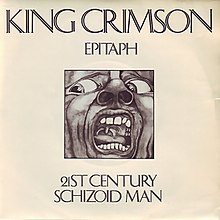Epitaph (song)
| "Epitaph" | |
|---|---|
| Song by King Crimson | |
| from the album In the Court of the Crimson King | |
| Released | 10 October 1969 |
| Recorded | 30 July 1969 |
| Genre | |
| Length | 8:47 |
| Label | Atlantic |
| Composer(s) | |
| Lyricist(s) | Peter Sinfield |
| Producer(s) | King Crimson |
| "Epitaph" | ||||
|---|---|---|---|---|
 UK picture sleeve | ||||
| Single by King Crimson | ||||
| from the album A Young Person's Guide to King Crimson | ||||
| B-side | "21st Century Schizoid Man" | |||
| Released | February 1976[2] | |||
| Length | 8:47 | |||
| Label | Atlantic | |||
| King Crimson singles chronology | ||||
| ||||
"Epitaph" is the third track on British progressive rock band King Crimson's 1969 album In the Court of the Crimson King. It was written by Robert Fripp, Ian McDonald, Greg Lake, and Michael Giles with lyrics written by Peter Sinfield.
The song is noted for its heavy use of the Mellotron.[3][4] As with the album's first track, "21st Century Schizoid Man", the song's lyrics have a distinctly dystopian feel to them and are presented as a protest to the Cold War.[3][5]
The song's title was used as the name for a live album of recordings done by the original King Crimson, Epitaph.[6]
Emerson, Lake & Palmer would later incorporate an excerpt from this song after the "Battlefield" portion of the live version of their song "Tarkus", from the Tarkus album, as documented in the live album Welcome Back My Friends to the Show That Never Ends... Ladies and Gentlemen.
"Stripes" from Cage's album Hell's Winter samples a middle part of the song throughout its duration.
Epitaph Records also took its name from the song.[7]
Track listing[edit]
In 1976, "Epitaph" was released as a single with "21st Century Schizoid Man" as the B-side, a companion to the compilation A Young Person's Guide to King Crimson (1976).
- "Epitaph" (including "March for No Reason" and "Tomorrow and Tomorrow") (Robert Fripp, Michael Giles, Greg Lake, Ian McDonald, Peter Sinfield)
- "21st Century Schizoid Man" (including "Mirrors") (Fripp, Giles, Lake, McDonald, Sinfield)
Personnel[edit]
- Robert Fripp – acoustic guitar, electric guitar
- Greg Lake – bass guitar, vocals
- Ian McDonald – Mellotron, harpsichord, piano, flute, organ, clarinet, bass clarinet
- Michael Giles – drums, percussion, timpani
- Peter Sinfield – lyrics
References[edit]
Sources[edit]
- Ayers, Michael D. (2006). Cybersounds: Essays On Virtual Music Culture. Peter Lang. ISBN 082047861X.
- Holm-Hudson, Kevin (2008). Genesis and The Lamb Lies Down on Broadway. Ashgate Publishing. ISBN 978-0754661399.
- Macan, Edward (1997). Rocking the Classics: English Progressive Rock and the Counterculture. Oxford University Press. ISBN 0195098870.
- Martin, Bill (1998). Listening to the Future: The Time of Progressive Rock, 1968–1978. Open Court Publishing. ISBN 081269368X.
External links[edit]
- 1969 songs
- 1976 singles
- King Crimson songs
- Rock ballads
- Songs with lyrics by Peter Sinfield
- Songs written by Robert Fripp
- Songs written by Ian McDonald (musician)
- Songs written by Greg Lake
- Songs written by Michael Giles
- Song recordings produced by Greg Lake
- Folk rock songs
- Symphonic rock songs
- Atlantic Records singles
- Song recordings produced by Ian McDonald (musician)
